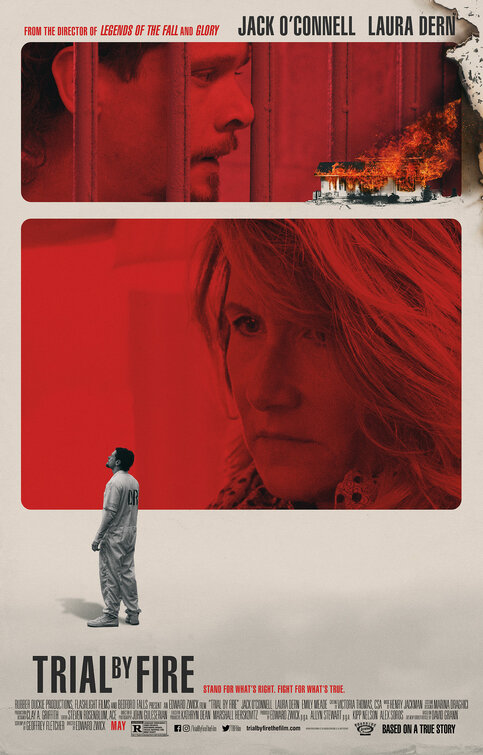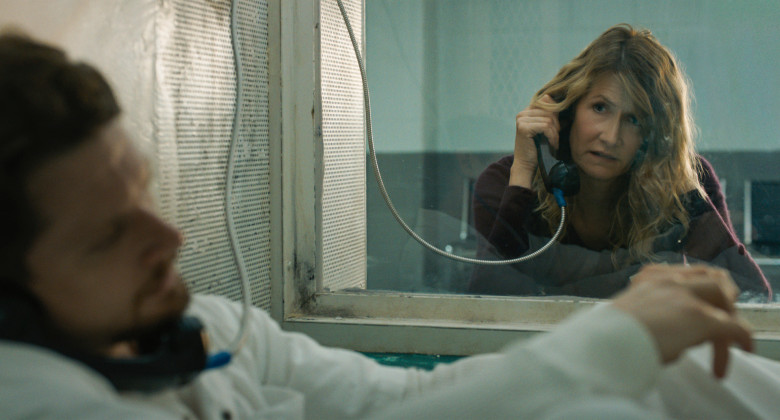by Chris Feil
 The first sign of Trial By Fire’s problems is that its title is a pun, and I welcome any and all puns. It's perhaps not the most sensitive way to approach a film that begins with a house fire that takes the lives of multiple children. Maybe don't do that.
The first sign of Trial By Fire’s problems is that its title is a pun, and I welcome any and all puns. It's perhaps not the most sensitive way to approach a film that begins with a house fire that takes the lives of multiple children. Maybe don't do that.
But then again, sensitivity isn’t the film’s strong suit. As directed by Edward Zwick (yes that Edward Zwick, primarily known for epics your dad might love like Glory and The Last Samurai), the film is a not-quite-thoughtful look at a true story of Death Row Texas. Jack O’Connell stars as Cameron Todd Willingham, a man convicted of a home arson that took the lives of his three children despite his claims of innocence. His case is doomed by prejudice and a corrupt system until he meets the correspondence of Laura Dern’s good samaritan Elizabeth Gilbert.
The film struggles to balance both Gilbert and Willingham’s perspectives, with Geoffrey Fletcher’s script (based on David Grann’s New Yorker article of the same title) unsure of how to share its focus between them. Its first act details the trial and first year of Willingham’s imprisonment, and it comes off rather tasteless in its arch redneck portrayals of Willingham and his wife Stacy (Emily Meade). The overpunctuated twang of these surroundings just make the procedural cliches of this section ring all the more loudly. The way it paints him reads like the film accidentally buys into the biases that the system has used against him, with not even O’Connell able to do much humanizing beyond the demands of plot mechanics.

But to the white poverty porn smudged with lifeless caricature, Trial By Fire meets its other protagonist with stark blandness. Dern’s arrival elevates the film to pure watchability, her steadfastly honest delivery like an oasis against the film’s otherwise forced notes throughout. After quickly establishing her as a do-gooder, there isn’t much shading beyond that. Elizabeth feels passive to even her own family story, even if Dern makes it very easy for us to stay engaged.
As Zwick similarly stumbled to achieve with his sex romp-edy Love and Other Drugs, the film tries to have its cake and eat it too by pulling itself in too many directions that it struggles to tie cohesively together. It wants to be both holistic Law and Order and righteous treatise against the death penalty. All of this is admirable but never as convincing as it should be, preachy without making its story be a vital one to the cause it’s representing. The systemic issues at work against Willingham are composed facelessly and vaguely, rendering The System into a monolith that it doesn’t seem to understand all that much. When it aims for the more specific target of Texas politicians as the credits roll, everything before it makes it miss the mark.
Ultimately, Trial By Fire is fatally disjointed is all of its pieces and lacking the humanity to make this an investing story worthy of its subject. It can only tread familiar ground and chooses to tread lightly - think Dead Man Walking by way of a significantly less demonstrative Erin Brockovich but on CBS Friday nights. Its also safely the weakest of the “imprisoned Jack O’Connell” subgenre.
Grade: C-